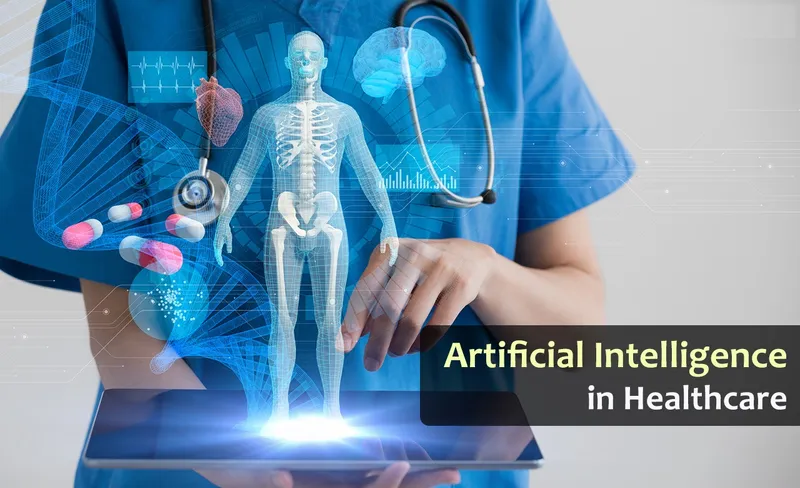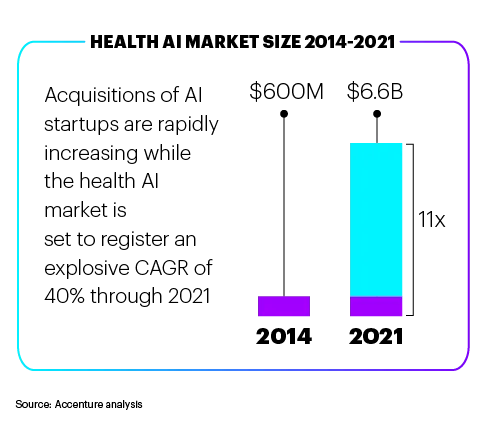

How is Artificial Intelligence Revolutionizing the Healthcare Industry?
Read here to know how is artificial intelligence changing & revolutionizing the healthcare industry.

It’s nearly impossible to comprehend the benefits of Artificial Intelligence in the healthcare industry, and now medical experts find Artificial intelligence (AI) technology unbelievably helpful and the future of Artificial Intelligence in medical field promises prosperity.
The importance of AI/Machine learning in healthcare is increasing day by day. The revolutionary role of AI can be felt and seen everywhere, from clinical research, drug development to hospital care and insurance.
AI-powered applications have brought about a huge change in the way healthcare sector works for the betterment of patient outcomes and spending reduction.
Technology has made its own place in the potential healthcare holds, and the amount invested in healthcare has turned out to be stunning.
As per recent updates, Accenture has estimated that the top AI applications could bring about annual savings of $150 billion by 2026.

Artificial Intelligence can lay a great impact on the healthcare industry
AI is endowed with the robust potential to assist the healthcare industry in improving accessibility, reducing costs, improving treatment and so on.
For Accurate Predictions in Diagnosis
Errors in diagnosis have become a reason for nearly 10% deaths. Here, the use of technology can be at its best wherein predictive analytics can be helpful to diagnose any ailment at an early stage and lessen patient deaths to a large extent.
Virtual Nursing Assistants
Modern technology has made it possible for the deployment of virtual nursing assistants for smoother, better, and more regular communication between medical service providers and patients.
There is no requirement to visit hospitals unnecessarily and be admitted again and again. Moreover, patients tend to have innumerable questions out of worry, and providing quick answers and monitoring patient’s condition has also become easy due to such technology.
Making Medical Facilities Reach the Underprivileged
There is a dearth of trained and highly-qualified medical facility providers like radiologists in many parts of the world owing to backwardness.
Use of AI and ML can be done by means of deploying bots to provide facilities in the undeserved places. Doing so, medical services can reach more and more people.
Artificial Intelligence Powered Machines and Devices
Smart devices which have made their own place and identity in every industry and healthcare industry is not left.
Such smart devices can play an important role in monitoring patients, enabling medical facility providers to those areas in which patients require urgent medication.
AI is doing more and more to improve the healthcare industry. It must be kept in mind that no technology can take the place of human physicians and their trust, compassion, and other human aspects.
However, the technology has the potential to change the accessibility, efficiency, and accuracy of medical services.
Here, we found it necessary to mention the potential application of technology that can make healthcare facilities much better:
1.Eye Disease Detection (Google Deepmind)
Google’s DeepMind has come in partnership with Moorfields Eye Hospital in order to train AI for the scanning of patient’s retinas for any potential eye disease by first highlighting something abnormal at the beginning stage in scans and after that putting treatment recommendations.
2. Detecting Brain Tumors (Microsoft)
Doctors in Cambridge at Addenbrooke’s Hospital have teamed up with the tech giant Microsoft for training machine learning algorithms with the purpose to spot and identify brain tumors in 3-d-magnetic-resonance-imaging (MRI) scans.
If systems are trained on MRI scans of those points where the tumors have been found highlighted, they will be able to recognize high-grade gliomas. They are tumors of the glial tissue within neurons in the brain, recognized with a level of accuracy.
3. Recognizing Lung Diseases (Optellum)
Optellum is known for the early prevention of lung disease through empowering clinician stationed in all hospitals to deal with their patients ideally.
Optellum was set up by clinical and machine learning specialists meeting at Oxford University’s computer vision lab. The company is programmed for the analysis of CT scans of nodules in the lungs to help doctors detect signs of lung disease.
4. Deliveries to Hospitals Using Drones
The National Health Service or NHS sought inspiration by work that companies like Zipline and Matternet did to deliver pathology specimens and blood with the help of drones between hospitals.
Having seen so, The NHS is also looking forward to trialling drone deliveries between hospitals.
5. Brain Scan Analysis of Stroke-Stricken Patients (VIZ.AI)
Viz.ai is known for providing a system where engineers and doctors deploy artificial intelligence in order to synchronize stroke care for making access to life-saving therapies much better.
Conclusion
Here, we discussed the benefits of AI applications in healthcare, and our points of discussion were their roles in the detection of eye disease, spotting brain tumors, identifying lung diseases, brain scan analysis of stroke patients, and the like.
The role and benefits of Artificial Intelligence in healthcare don’t end here, even they surpass their expectations. And, machine learning in healthcare is making medical machines and system more advanced year by year.
Artificial intelligence in the medical field has innumerable benefits to offer. However, a heap of challenges come up when it comes to the adoption and implementations of these AI and machine learning applications in healthcare and the tools powered with such advanced technologies.
Healthcare industry will be benefited from technology only when the routine and mundane tasks are given to robots, and by doing so, providing patients to self-service their own medical care requirements using technology.
If you wish a bright future for your healthcare business, you must hire machine learning developers from ValueCoders, who can convert your wishes into reality.
Having the best healthcare software development company standing by you will not only take your business to the next level but will also make you free from worries, thus you can invest your mind in something beneficial for your business.




.jpg?mode=crop&crop=faces&ar=1%3A1&format=auto&w=1920&q=75)
![Top 10 Cheap Indian Press Release Distribution Services [Updated]](https://images.yourstory.com/cs/1/b3c72b9bab5e11e88691f70342131e20/LOGO-DESIGN-PR-INDIA-WIRE-03-1595693999405.png?mode=crop&crop=faces&ar=1%3A1&format=auto&w=1920&q=75)